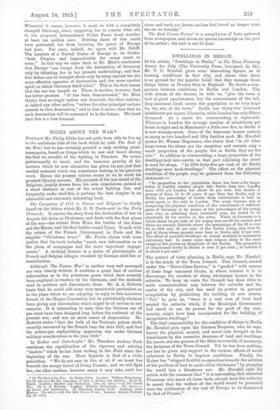DWELLINGS IN BERLIN.
IN his article, "Dwellings in Berlin," in The Town Planning Review for July (The University Press, Liverpool, 2s. 6d.), Me. T. C. Horsfall gives some interesting figures as to housing conditions in that city, and shows that there is no ground for the popular belief that they manage these things better in Prussia than in England. He draws a com- parison between conditions in Berlin and London. The wide streets of the former, he tells us, "give the town a look of great spaciousness, but the commonness of the tall, deep tenement block causes the population to be very large for the size of the town.". Berlin has thirty-two thousand inhabitants per square kilometre, while London has only fifteen thousand. As a result the overcrowding is deplorable. Whereas in London the average number of inhabitants per house is eight and in Manchester a little over five, in Berlin it is now seventy-seven. Some of the tenement houses contain as many as two hundred and fifty families each. Mr. Horsfall quotes Dr. Werner Hegemann, who states that "in all other large towns the slums are the exception and contain only a small proportion of the people, but in Berlin they are the rule." In addition to overcrowding, a large proportion of the dwellings look into courts, as that part adjoining the street is used for shops. "In 1910 forty-five per cent. of all Berlin dwellings were back-dwellings." The effect on the physical condition of the people may be gathered from tho following statement "In proportion to the population there has been a far larger influx of healthy country people into Berlin than. into Lomfon since 1870, yet London has about 30 per cent. less deaths of persons of from 15 to 25 years of age than has Berlin, and in Berlin the percentage of deaths from tuberculosis is half as great again as the rate in London. The usual German way of comparing the physical condition of the inhabitants of different parts of Germany is by means of the percentages of the young men who, on attaining their twentieth year, are found to ho physically fit for service in the army. While in Germany as a whole about 64 per cent. of the young men are fit for service, and there are country districts where the percentage of the fit is over 80, in 1903 only 33 per cent, of the Berlin young men were fit, and of those whose parents were born in Berlin only 19 per cent. The effect of crowded dwellings on sexual morality is necessarily extremely bad. In many cases men lodgers sleep in the same rooms as the grown-up daughters of the family. The proportion of illegitimate births in Berlin is over 17 per cent.; in London it is about 5 per cent."
The control of town planning in Berlin, Kays Mr. Horsfall, is in the hands of the Town Council. This Council, elected under the "Three-Class-System," is " packed " with owners of these huge tenement blocks, in whose interest it is to discourage the erection of cheap wholesome houses in the suburbs. To keep up rents the Council has done little to make communication easy between the suburbs and the centre of the city, and has used its powers to prevent competition by prohibiting the building of new streets. "Yet," he goes on, "there is a vast area of level land around the suburbs which, if the Municipal Government had oared to use its powers for the good of the com- munity, might have been incorporated for the building, of inexpensive dwellings."
The final responsibility for the condition of things in Berlin Mr. Horsfall puts upon the German Emperor, who, he says, knows the physical, mental, and moral ruin brought on the inhabitants by the excessive dearness of land and dwellings. He knows also the powers of the State to override, if necessary, the decisions of the Town Council. Yet he has done nothing, nor has he given any support to the various efforts of social reformers in Berlin to improve conditions. Finally, the Kaiser has "stopped fruitful co-operation towards the solution of the problem of how to make cities wholesome" by plunging the world into a disastrous war. Mr. Horsfall ends his article with the comment that "it is astounding that educated Prussians who know all these facts should have the audacity to assert that the welfare of the world, would be promoted were the civilization of the rest of Europe to be dominated by that of Prussia."


































 Previous page
Previous page